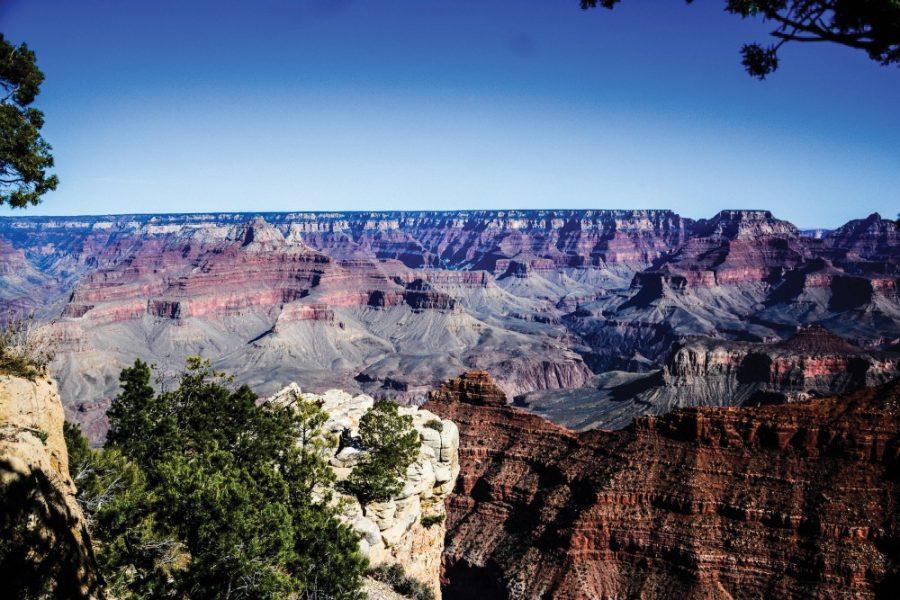Changes in federal land rules, and rejection of land protection, could change the federally owned Grand Canyon National Park as we know it.
Having most of United States’s west owned and maintained by the Federal Government of the United States diminishes pollution, allows U.S. citizens to enjoy these national lands without worry of the rise of commercial development and keeps the land from burdening the local governments with their high maintenance bill.
Those in support of keeping the federal government involved in federal lands include conservationists, hunters, anglers, hikers and many more who enjoy our national parks.
Last week, a new rule was supported by the GOP and passed in the House, making it easier for federal land to be transferred to local governments.
This new rule could directly affect the people of Arizona, making it possible for the Grand Canyon to be passed along to Flagstaff.
Flagstaff has largely profited from the Grand Canyon in past because of the tourists it brings to the town, creating money for local businesses. The problem with local governments being in charge of land like this is the local government will have to pay to maintain the land, which would come at a large cost for the residents of Arizona and the people of Flagstaff.
RELATED: Stopping the Dakota Access Pipeline is still an ongoing battle
Those who support the transfer of federal land to local land are not pleased that this land cannot be taxed because it is not property of the state. In order to pay for this land, state taxes would have to rise or pieces of the land would have to be sold off to private developers, which defeats the purpose of having these protected federal lands.
Arizona’s Democratic Rep. Raúl Grijalva is one of the Arizonans that is in support of Arizona’s land being protected and maintained by the federal government.
Grijalva attempted to pass legislation that would make 1.7 million acres north and south of the Grand Canyon the Greater Grand Canyon Heritage National Monument under Theodore Roosevelt’s Antiquities Act of 1906. But this past week President Barack Obama declined to make this land into a national monument. The people against this land act do not want the land around the Grand Canyon to become a national monument because of the high amounts of uranium in this area and the surrounding trees that could be exploited for logging.
If this area were a national monument it would make mining and logging illegal.
As of 2012, President Obama put a 20-year ban on uranium mining across a million acres surrounding the Grand Canyon, which will allow the mines to reopen in 2032.
RELATED: The electoral college is for all of America
If the Greater Grand Canyon Heritage National Monument Act would have passed, it would put an indefinite ban on uranium mining around the Grand Canyon.
The national monument’s advocates, who are primarily made up of conservationists and tribal groups, see uranium mining as harmful to the Grand Canyon. Uranium mining has caused problems with pollution and water contamination in the past, and are still lingering.
The land in the proposed monument would have protected the Colorado River and its watershed from potential uranium pollution due to mining activities.
This potentially endangered water supply, supplies drinking water to over 25 million people who live downstream from the lands. The land is sacred to Native American culture, and the mining companies would not only take up their space, but likely release a tremendous amount of pollution. The creation of the Greater Grand Canyon Heritage National Monument was officially backed by the Hopi, Navajo, Hualapai and Havasupai tribes.
By keeping the land in the American West federal, we are allowing this space to remain untouched by potentially harmful private corporations and developers.
The beauty of the west is its natural land and scenery, used for outdoor recreation, and enjoyed by so many people. Though the argument could be made that this land could be used to create money, rather than just sitting there, the land already indirectly makes money. Cities like Flagstaff, and their local businesses, make money from the tourists that visit from across the state, country and world.
So much of the natural world has suffered at the hands of humans, the last thing the world needs is more dilapidated land.
Follow Claudia Drace on Twitter.









